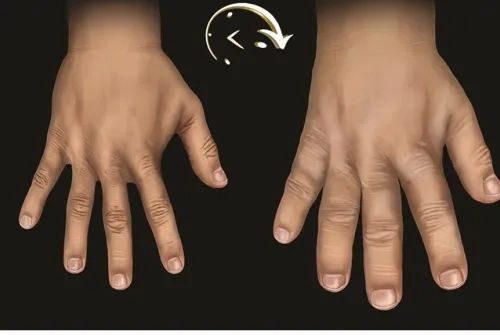Alo Yeditepe
Alo Yeditepe
What is Acromegaly Disease?
Endocrinology and Metabolic Diseases Specialist said that although acromegaly disease has very distinct symptoms and signs, the diagnosis of the disease is made late and pointed out that in studies, the period from the onset of symptoms to diagnosis is delayed up to 5-10 years. In this sense, he stated that social awareness should be increased and made important statements on the occasion of "Acromegaly Awareness Day".
What is Acromegaly Disease?
Acromegaly, also commonly known as a "growth disease", can occur in children, adolescents or adulthood.
What Causes Acromegaly?
Acromegaly, a rare metabolic disease, usually occurs as a result of excessive growth hormone secretion by a benign tumor originating from the pituitary gland.
Yeditepe University Kozyatağı Hospital Endocrinology and Metabolic Diseases Specialist pointed out that due to delay in diagnosis of the disease, the risk of developing heart failure, high blood pressure, diabetes and some cancers increases.
Our expert said that excessive secretion of growth hormone seen in acromegaly causes serious diseases in the body and said, “Heart enlargement, heart failure and cardiovascular diseases, high blood pressure, diabetes and cerebrovascular diseases are some of these. It has also been shown that due to uncontrolled growth, there is an increase in the formation of thyroid nodules and polyps in the intestine and an increased incidence of malignant tumors of the large intestine, breast and thyroid gland. Pointing out that for all these reasons, acromegaly is a disease that shortens life expectancy if left untreated, our expert stated that although acromegaly has very distinct symptoms and signs, research can delay the diagnosis of the disease by 5-10 years from the onset of symptoms.
What are the symptoms of Acromegaly Disease?
Our specialist explained that the most important reason for late diagnosis is the slow progression of the disease and the slow emergence of symptoms, and that patients and their relatives cannot notice especially the physical changes, and gave the following information:
“One of the most effective ways to notice the symptoms is to look at old photos. When looking at old photographs, major changes in the face, for example, can be clearly seen. In addition, patients consult physicians in relevant branches according to their complaints. For example, a dentist for dental problems, ENT or pulmonologists for snoring problems, physical therapy or orthopedic specialists for joint problems. Therefore, it is important for physicians in this specialty to recognize the symptoms and signs of acromegaly.
Rings Are Too Small, Shoe Size Grows…
According to the information given by our expert, excessive secretion of growth hormone leads to excessive growth in the tissues and organs in the body. If this excessive secretion develops in childhood and adolescence, when growth has not yet been completed and the bones have not finished growing, the patient may develop excessive height growth (giantism). When this condition occurs in adulthood, after the closure of the growth plates, it manifests itself with symptoms such as enlargement of hands and feet, rings becoming narrower and shoe sizes increasing.
Stating that there were also changes in the patient's physical appearance, our specialist continued as follows: "In adults, coarsening of facial features, prominence in the chin and forehead, separation of teeth, deepening of the voice, snoring and sleep apnea syndrome due to overgrowth of the soft tissues in the tongue and upper palate, impaired sexual functions." Symptoms such as decrease, muscle-joint pain due to excessive growth in bones and muscles, and excessive sweating are common. "In addition, headaches and visual disturbances may occur due to the pressure effect of the pituitary gland tumor."
How is Acromegaly Diagnosed?
Explaining that laboratory tests and imaging methods are used together for diagnosis in patients with suspected acromegaly, our expert gave the following information: “First of all, growth hormone in the blood and insulin-like growth factor-1 (IGF-1), which is synthesized in the liver under the influence of growth hormone, are examined. If the IGF-1 level is detected to be high, the growth hormone level is evaluated with a sugar loading test to confirm the diagnosis. In addition to these examinations, MRI imaging of the pituitary gland is performed to detect the tumor from which the hormone is secreted.”
Treatment of Acromegaly Disease
Yeditepe University Kozyatağı Hospital Endocrinology Metabolism Diseases Specialist said that the first and gold standard treatment for patients whose diagnosis of acromegaly is confirmed by laboratory and imaging tests is the surgical removal of the tumor from the pituitary gland.
“Treatment methods such as radiotherapy or stereotactic radiosurgery can be used to the tumor area in patients with insufficient hormone control after surgery, or in patients with acromegaly that cannot be controlled despite drug therapy and surgery. The important thing at this point is to make the diagnosis in time. “Increasing social awareness is extremely important for early diagnosis.”
About
Faculty and Year of Graduation:
Marmara University Faculty of Medicine, 2005
”
See Also
- How to Prevent Type 2 Diabetes?
- What Are Weight Loss Injections? How Are They Used?
- What is Hypoglycemia?
- What is Obesity? Obesity Symptoms, Diagnosis and Treatment
- Did You Know That Our Bodies are Managed by Hormones?
- Misconceptions About Hypertension
- What is Hypertension?
- Chronic Pelvic Pain
- What is Polycystic Ovary Syndrome/PCOS?
- The Hidden Problem Seen in One out of Every 10 Women: HIRSUTISM
- Persistent Headache May Be a Sign of Tumor
- The Purpose of Pituitary Diseases is to Avoid Waste of Time with the Right Treatment
- Pelvic Floor Muscles Should Be Addressed with a Multidisciplinary Approach
- Protect Children From Sports That Will Knock Their Head
- Taking a Leave Is as Useful as Quitting Smoking
- Polycystic Ovary Syndrome Can Occur If the Bacteria in the Gut Are Not Functioning Well
- Doctor Support for the Ban on Heading by Children
- Does an Egg Raise Cholesterol?
- Head Trauma Can Cause Permanent Damage
- Diabetes Mellitus and its Treatment
- Treatment of Pituitary Adenomas
- Surgical Treatment of Pituitary Diseases
- Pituitary Clinic | FAQs
- What are Pituitary Diseases?
- What is the Pituitary Gland, What are its Functions?
- What is Hirsutism?
- Hirsutism Clinic / FAQs
- Treatment Success in Brain Tumors Also Depends on the Family
Alo Yeditepe







